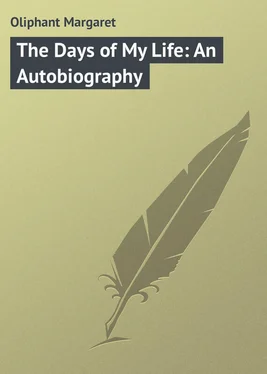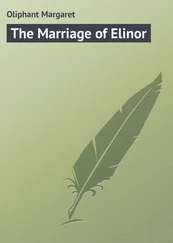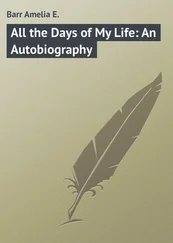Margaret Oliphant - The Days of My Life - An Autobiography
Здесь есть возможность читать онлайн «Margaret Oliphant - The Days of My Life - An Autobiography» — ознакомительный отрывок электронной книги совершенно бесплатно, а после прочтения отрывка купить полную версию. В некоторых случаях можно слушать аудио, скачать через торрент в формате fb2 и присутствует краткое содержание. ISBN: , Жанр: foreign_prose, на английском языке. Описание произведения, (предисловие) а так же отзывы посетителей доступны на портале библиотеки ЛибКат.
- Название:The Days of My Life: An Autobiography
- Автор:
- Жанр:
- Год:неизвестен
- ISBN:http://www.gutenberg.org/ebooks/43404
- Рейтинг книги:5 / 5. Голосов: 1
-
Избранное:Добавить в избранное
- Отзывы:
-
Ваша оценка:
- 100
- 1
- 2
- 3
- 4
- 5
The Days of My Life: An Autobiography: краткое содержание, описание и аннотация
Предлагаем к чтению аннотацию, описание, краткое содержание или предисловие (зависит от того, что написал сам автор книги «The Days of My Life: An Autobiography»). Если вы не нашли необходимую информацию о книге — напишите в комментариях, мы постараемся отыскать её.
The Days of My Life: An Autobiography — читать онлайн ознакомительный отрывок
Ниже представлен текст книги, разбитый по страницам. Система сохранения места последней прочитанной страницы, позволяет с удобством читать онлайн бесплатно книгу «The Days of My Life: An Autobiography», без необходимости каждый раз заново искать на чём Вы остановились. Поставьте закладку, и сможете в любой момент перейти на страницу, на которой закончили чтение.
Интервал:
Закладка:
“Alice, how can it come to me?” cried I, trying to smile at her earnestness, yet I was angry for her implied blame of my father, and at the moment Edgar Southcote’s rejected overtures flashed upon my mind. Yes! if by any chance these had been accepted, the curse of my father’s life would have come to me. I was silent, oppressed by a vague discomfort; it was foolish, but I could not overcome it, and Alice did not answer my question, but returned to her work once more.
When Mary came back with the novel I wanted, I confess that I ran up stairs with it, and that there ensued an immediate dispersion of my thoughts – nor did I recal them much till the evening when I had galloped through the three volumes, and was left sitting by the fire in the sudden reaction of excitement, to cogitate upon the disagreeable necessity common to stories, of coming to an end. My father, who, from habit and punctilio, never returned to the library in the evening, sat at the table as usual with his book, and after a little pause of impatience at the conclusion of my tale, I resumed the thread of my previous meditations. I had been a little startled and shaken to-day in my thoughts. To say that I was inclined to scoff at the youthful notion of a life determined once and for ever by the misfortune which Alice mentioned as being “crossed in love,” would be to say what was not true – for my ideal belief in this extraordinary and all-powerful unknown influence was as devout as that of any girl or boy of my years, and I had an equal admiration for that melancholy constant faithful lover, doomed to be unrequited, and never to overcome his disappointment, of whose existence many a romance had made me aware. But I was misanthropical to-night from the abrupt ending of my novel – and there was still the greater part of the evening left vacant with no new story to begin – so I speculated with a more sceptical mind than usual upon my great problem. Was it my mother, so many years ago – twenty years or more, a fabulous and unappreciable period, before I was born – whose rejection of him had fixed Mr. Osborne in his rooms at Corpus, and made the records of his life little better than a library catalogue? Was it my mother, and his disappointment in her, which had cast my father into his existence of aimless and sombre dignity? Was all this the single work of a young girl who died nearly seventeen years ago, and who was not much more than twenty when she died?
I was much perplexed to answer this question; though it flattered my pride as a woman shortly to enter upon the field myself, and perhaps make decisions of equally momentous result to somebody, it sadly bewildered my perceptions of right and wrong. I felt humbled rather than exalted in my own self-opinion by the idea, that anything I said or did could produce such consequences; and I could not understand about Mr. Osborne. He, with his shrewd merry eyes, his regard for all his own comforts and luxuries, his want of sentiment and melancholy – that he should be the disappointed lover, almost exceeded my powers of belief. I was glad to think that he must have “got over it,” but I was greatly puzzled to make the conclusion whether it could be this that decided the manner of his life.
My father was extremely absorbed in his book to-night – more than usually so I thought; and I am afraid that circumstance made me still more disposed to question him, unoccupied and idle as I was. I had disturbed him two or three times already by stirring the fire, and moving my seat, and had perceived his quick upward glance of impatience, but I was not deterred from beginning my investigations.
“Papa, have you known Mr. Osborne a very long time?” said I, looking at his face in the lamplight, and at the ray of reflection which came from the diamond on his finger. He looked up sharply as if not quite comprehending.
“Known Mr. Osborne? – yes, a long time, Hester – since I was a boy.”
“And do you know why he lives here – why he is not married, papa?” I continued quietly.
My father looked up with a smile. “He is not married because he did not choose it, I suppose; and because he is a fellow, and has his income on that condition. Osborne is a scholar, and not a family man.”
“I wonder now what is the good of being a scholar,” said I. “Is Mr. Osborne poor? Does he do it for the sake of his income? Yes! I know all these colleges are for making scholars – but then, what is the good of it, papa?”
“Hester, you speak like a child,” said my father with a little anger; “you might say in the same foolish words what is the good of anything – what is the good of life?”
“And so I do,” said I with a little terror, and in an undertone.
“So! I have a young misanthrope on my hands – have I?” said my father; “we will not enter on that question, but return to Mr. Osborne, if you please, for I am busy. Are you very sorry for Mr. Osborne, Hester?”
“No, papa,” said I.
“I am glad to hear it – there is no such prolific source of evil in the world,” said my father gradually becoming vehement, “as false and injudicious pity – take care you never let that fictitious principle sway your conduct, Hester. Justice – let every man have justice – and he who is not content with that deserves no more.”
He ceased abruptly, and returned to his book with a stern face. This was enough for me; all my questionings disappeared at once, in the greatness of my sympathy for my father. I thought again upon Edgar Southcote, and upon his “generous impulse.” I unconsciously associated myself with my father, and took his place, and tried to fancy the intolerable misery with which I should feel the substitution of pity and generosity in my own case, for that unknown love, that wonderful visionary influence which was in my favorite stories, and in my girlish dreams – and my heart returned to its former confidence in my father, and passionate feeling of his great wrong. His life had been blighted – who could deny it! he who was so well worthy of the loftiest affection, he had found nothing better than pity in its place.
It is not my wish to trace all we did hour by hour in our solitary house, or I might record many a day like this. This was not a day of very vital moment in my life – but it was one which confirmed into singular strength and obstinacy, the influences which have guided and led me through many a more momentous day.
THE FIFTH DAY
ALL this day, with a degree of expectation and excitement, of which I felt somewhat ashamed, I had been preparing for a party to which, at the instance of Mr. Osborne, I was to go in the evening. It was a ridiculous thing for a girl of nineteen – that was my age now – to think so much of a party which was by no means a great party, nor had anything remarkable about it; but, though I was so old, I had never been out anywhere before, and much as I denied it to myself, this was really an event for me. Our days were all so like each other, of such a uniform color and complexion, that it was something to be roused even to anxiety for a becoming dress. We were not precisely poor – this old house in which we lived was my father’s property, and though I did not know what was the amount of the income which he inherited, along with this house, from his mother, I knew it was enough to maintain us in comfort, and that nothing in the household was ever straitened. But, I had never gone out in the evening before, and I did not very well know what to wear. Alice and I had a great many consultations on the subject. For my own part, I thought white muslin was only suitable for girls , and very young people, and at nineteen I no longer thought myself very young; and I had no patience for the pink and blue in which dolls were dressed as well as young ladies – it was very hard to please me – and the question remained still undecided, even to the afternoon of this very day —
Читать дальшеИнтервал:
Закладка:
Похожие книги на «The Days of My Life: An Autobiography»
Представляем Вашему вниманию похожие книги на «The Days of My Life: An Autobiography» списком для выбора. Мы отобрали схожую по названию и смыслу литературу в надежде предоставить читателям больше вариантов отыскать новые, интересные, ещё непрочитанные произведения.
Обсуждение, отзывы о книге «The Days of My Life: An Autobiography» и просто собственные мнения читателей. Оставьте ваши комментарии, напишите, что Вы думаете о произведении, его смысле или главных героях. Укажите что конкретно понравилось, а что нет, и почему Вы так считаете.












